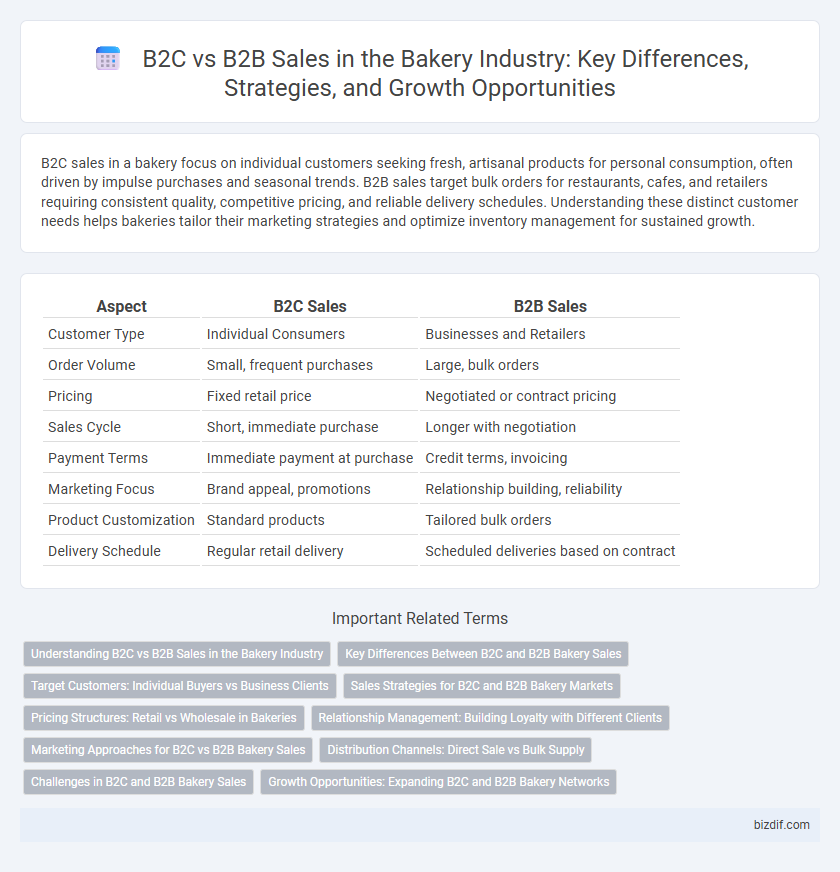B2C sales in a bakery focus on individual customers seeking fresh, artisanal products for personal consumption, often driven by impulse purchases and seasonal trends. B2B sales target bulk orders for restaurants, cafes, and retailers requiring consistent quality, competitive pricing, and reliable delivery schedules. Understanding these distinct customer needs helps bakeries tailor their marketing strategies and optimize inventory management for sustained growth.
Table of Comparison
| Aspect | B2C Sales | B2B Sales |
|---|---|---|
| Customer Type | Individual Consumers | Businesses and Retailers |
| Order Volume | Small, frequent purchases | Large, bulk orders |
| Pricing | Fixed retail price | Negotiated or contract pricing |
| Sales Cycle | Short, immediate purchase | Longer with negotiation |
| Payment Terms | Immediate payment at purchase | Credit terms, invoicing |
| Marketing Focus | Brand appeal, promotions | Relationship building, reliability |
| Product Customization | Standard products | Tailored bulk orders |
| Delivery Schedule | Regular retail delivery | Scheduled deliveries based on contract |
Understanding B2C vs B2B Sales in the Bakery Industry
B2C sales in the bakery industry focus on individual consumers purchasing fresh products for immediate consumption, emphasizing product variety, packaging, and convenience. B2B sales involve bulk orders from cafes, restaurants, and retailers, prioritizing consistent quality, competitive pricing, and reliable delivery schedules. Understanding these distinctions allows bakeries to tailor marketing strategies and optimize supply chain management for each customer segment.
Key Differences Between B2C and B2B Bakery Sales
B2C bakery sales target individual customers seeking immediate satisfaction, emphasizing appealing packaging, variety, and convenience for on-the-go consumption. B2B bakery sales focus on bulk orders, consistent supply, and customization to meet specific business needs such as restaurants, cafes, or hotels. Pricing strategies differ, with B2B transactions often involving negotiated contracts and longer payment terms, while B2C sales rely on fixed prices and impulse purchasing behavior.
Target Customers: Individual Buyers vs Business Clients
B2C sales in the bakery sector primarily target individual buyers seeking fresh, ready-to-eat products such as bread, pastries, and cakes for personal consumption. B2B sales focus on business clients like restaurants, cafes, and hotels requiring bulk orders and customized baked goods to support their operations and menus. Understanding the distinct needs of each customer segment enables bakeries to tailor their marketing, product offerings, and pricing strategies effectively.
Sales Strategies for B2C and B2B Bakery Markets
B2C bakery sales strategies prioritize engaging consumers through direct marketing, social media promotions, and personalized product offerings like custom cakes to enhance customer loyalty and impulse purchases. B2B bakery sales focus on volume orders, long-term contracts, and consistent quality to meet the demands of retailers, cafes, and corporate clients. Effective segmentation and tailored communication are essential for optimizing sales performance in both B2C and B2B bakery markets.
Pricing Structures: Retail vs Wholesale in Bakeries
Retail pricing in bakeries targets individual consumers, often featuring higher per-unit costs to cover packaging, marketing, and smaller purchase volumes. Wholesale pricing structures focus on bulk orders from businesses such as cafes or grocery stores, offering discounted rates per unit to encourage large volume sales and long-term contracts. Efficient wholesale pricing models help bakeries optimize production costs and maintain steady cash flow, contrasting with the more variable and promotional retail pricing strategies.
Relationship Management: Building Loyalty with Different Clients
B2C bakery sales prioritize personalized customer experiences and emotional connections to build loyalty through direct engagement and tailored promotions. B2B sales emphasize strategic partnerships, consistent product quality, and reliable service to maintain long-term contracts and bulk orders. Effective relationship management in both sectors requires understanding unique client needs and delivering value that fosters trust and repeat business.
Marketing Approaches for B2C vs B2B Bakery Sales
B2C bakery sales emphasize emotional appeal, showcasing artisanal quality and freshness through social media campaigns and influencer partnerships to attract individual customers. B2B bakery marketing focuses on demonstrating reliability, bulk pricing, and consistent supply, often utilizing direct sales teams and industry trade shows to establish relationships with retailers and restaurants. Tailoring messaging to highlight convenience and brand story drives consumer loyalty, whereas cost-efficiency and service excellence are key selling points in B2B bakery channels.
Distribution Channels: Direct Sale vs Bulk Supply
Bakery businesses leveraging B2C sales channel prioritize direct sale through storefronts, online orders, and local markets, enabling personalized customer interaction and immediate product feedback. In contrast, B2B sales focus on bulk supply to restaurants, cafes, and grocery chains, emphasizing consistent volume, reliable delivery schedules, and contract-based pricing. Distribution efficiency in B2B often relies on partnerships with logistics providers, while B2C channels benefit from localized, flexible delivery options to enhance customer experience.
Challenges in B2C and B2B Bakery Sales
B2C bakery sales face challenges such as fluctuating consumer preferences, seasonal demand, and the need for effective branding to attract repeat customers. B2B bakery sales often involve complex negotiations, large order volumes with strict delivery schedules, and maintaining consistent product quality to meet client expectations. Both channels require tailored marketing strategies to address their unique operational and customer relationship challenges.
Growth Opportunities: Expanding B2C and B2B Bakery Networks
Expanding B2C bakery sales opens direct consumer engagement, driving brand loyalty and customized product offerings that meet evolving taste trends. Growing B2B networks enhances bulk order volumes and consistent revenue streams through partnerships with cafes, hotels, and retailers. Combining both approaches leverages market reach and diversified income, fostering robust growth in competitive bakery sectors.
B2C sales vs B2B sales Infographic

 bizdif.com
bizdif.com